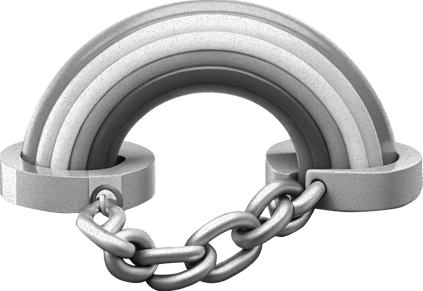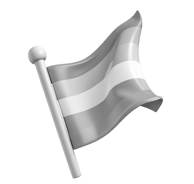After “Extremism”: Repression Against the LGBTQ+ Community in 2024






This report presents an analysis of repressive measures directed against the LGBTQ+ community in Russia in 2024. It collects and systematizes 379 cases of persecution, including arrests, fines, bans on the activities of organizations, and the blocking of informational resources. The analysis is based on data from Russian and international human rights organizations, journalistic investigations, and court decisions.
Discriminatory repressive laws against LGBTQ+ people in Russia have been implemented since 2013, and for over a decade they have contributed to the tightening of restrictions on the dissemination of information about LGBTQ+ people, censorship in the media space, restrictions for transgender people, and other forms of pressure. One of the harshest legislative steps was the 2023 decision of the Supreme Court of Russia, which recognized the “International LGBT Public Movement” as an extremist organization. This led to increased pressure on activists, human rights initiatives, the cultural and arts sector, and individuals who identify as LGBTQ+.
The document reviews the main directions of repression, including legislative measures, court cases, raids on venues, arrests of activists, assaults, and pressure on cultural and educational initiatives. The analysis also includes examples from Russian regions, demonstrating the scale of state control and its consequences for LGBTQ+ people.
Main Information Sources
1. Moskovsky Komsomolets: mk.ru
2. Parni+: parniplus.com
3. Important Stories: istories.media
4. Mediazona: zona.media
5. SOVA Center: www.sova-center.ru
6. 49 NewS: 49.ru
7. Roskomsvoboda: oskomsvoboda.org
8. Verstka: verstka.media
Key Repressive Legal Acts Against the LGBTQ+ Community
December 5, 2022: Federal laws came into effect that strengthen liability for distributing both positive and neutral information about LGBTQ+ people, as well as about sexual orientation and gender identity. (Federal Law No. 479-FZ of 05.12.2022; Federal Law No. 478-FZ of 05.12.2022; Federal Law No. 135-FZ of 29.06.2013)
July 24, 2023: A federal law banning civil rights for transgender people came into force in Russia. It prohibits legal and medical gender transition. The state also legalized surgical interventions on the genitalia of intersex children. (Federal Law No. 386-FZ of 24.07.2023)
November 30, 2023: The Supreme Court of the Russian Federation recognized the “International LGBT Public Movement” and its “structural subdivisions” as extremist organizations and banned their activities in the Russian Federation.
Monitoring Covered
Cities:
1. Moscow
2. St. Petersburg
3. Tula
4. Krasnoyarsk
5. Kemerovo
6. Orenburg
7. Yekaterinburg
8. Voronezh
9. Irkutsk
10. Tomsk
11. Perm
12. Samara
13. Novosibirsk
14. Krasnodar
15. Nizhny Novgorod
16. Belgorod
17. Chelyabinsk
18. Vladimir
19. Makhachkala
20. Volgograd
21. Ufa
22. Vladivostok
23. Yakutsk
24. Tambov
25. Minusinsk
26. Sevastopol (annexed Crimea)
27. Naberezhnye Chelny
28. Arkhangelsk
29. Slavyansk-on-Kuban
30. Astrakhan
31. Murmansk
32. Ulyanovsk
33. Inza
34. Cheboksary
35. Yelets
36. Koltushi
37. Orsk
38. Gatchina
39. Saratov
40. Zlatoust
41. Yoshkar-Ola
42. Khabarovsk
43. Petrozavodsk
44. Pskov
45. Sochi
46. Abakan
47. Anadyr
48. Barnaul
49. Kursk
50. Rostov-on-Don
51. Magnitogorsk
52. Zelenograd
53. Saransk
54. Stavropol
Regions:
1. Moscow Oblast
2. Leningrad Oblast
3. Saratov Oblast
4. Kemerovo Oblast
5. Krasnoyarsk Krai
6. Stavropol Krai
7. Republic of Tatarstan
8. Republic of Mari El
9. Republic of Dagestan
10. Republic of Bashkortostan
11. Republic of Karelia
12. Chuvash Republic
13. Yakutia (Sakha Republic)
14. Orenburg Oblast
15. Chelyabinsk Oblast
16. Tula Oblast
17. Vladimir Oblast
18. Volgograd Oblast
19. Primorsky Krai
20. Khabarovsk Krai
21. Pskov Oblast
22. Arkhangelsk Oblast
23. Kaluga Oblast
24. Kursk Oblast
25. Zabaykalsky Krai
26. Tambov Oblast
27. Republic of Mordovia
28. Altai Krai
29. Yamalo-Nenets Autonomous Okrug
30. Chukotka Autonomous Okrug
Initiators of Repression Among Government Bodies and Law Enforcement Agencies
Courts (district, city, cassation) — rulings on administrative and criminal cases.
Center “E” (Center for Countering Extremism) — initiates cases, monitors social media activity.
Roskomnadzor — blocks websites, restricts content, fines for “LGBT propaganda”.
Prosecutor General’s Office of the Russian Federation — files claims to block information, recognizes materials as extremist.
Ministry of Justice of the Russian Federation — includes individuals and organizations in the registry of “foreign agents”.
Ministry of Internal Affairs (MVD) — participates in detentions, raids, and administrative investigations.
Investigative Committee of the Russian Federation — conducts criminal investigations.
FSB — involved in detentions and searches.
Rosgvardiya — participates in raids and detentions.
State Duma of the Russian Federation — proposes and passes laws concerning LGBTQ+ people and censorship.
Government of the Russian Federation — initiates bans and legal amendments.
Overall Statistics of Rights Violations Against LGBTQ+ Persons as Recorded in the Media
A total of 379 cases of persecution of LGBTQ+ individuals and organizations were recorded in Russia in 2024 by the monitor of this report. Below are selected examples (not an exhaustive list).
1.
Legislative and Judicial Measures Against LGBTQ+
1.1. Ban and Recognition of the LGBTQ+ Movement as Extremist
December 2023 — The Supreme Court of Russia recognized the “International LGBT Public Movement” as an extremist organization.
The decision came into force in January 2024.
In March 2024, Rosfinmonitoring added the “International LGBT Public Movement and its structural subdivisions” to the list of terrorists and extremists.
Inclusion in the list led to the blocking of Telegram channels (e.g., “Center T”). It also enabled the freezing of bank accounts belonging to LGBTQ+ activists listed as “extremists and terrorists.”
February 2024 — The Saratov Regional Court ruled that the rainbow flag could be recognized as a symbol of an extremist organization.
May 2024 — The State Duma considered a new law allowing the police to deport foreigners for LGBT propaganda.
1.2. Cases of “LGBT Propaganda”
January 2024 — A Moscow court fined the TV channel Zhara 1 million rubles for “LGBT propaganda.”
February 2024 — In Krasnoyarsk, the bar Elton was fined 450,000 rubles for “LGBT propaganda.”
March 2024 — A Moscow court fined the online cinema more.tv 500,000 rubles for showing a film with LGBTQ+ characters.
May 2024 — The organization Nashe Delo in Mari El was fined 500,000 rubles for screening Darren Aronofsky’s film The Whale.
September 2024 — In Moscow, trials were held against blogger and openly transgender woman Milana Petrova, who was found guilty of “LGBT propaganda” and fined.
December 2024 — A court found a man from Tula, who ran a fake VKontakte page where he posted “videos of a homosexual nature,” guilty of “LGBT propaganda using the Internet” and fined him 100,000 rubles.
1.3. Court Cases Against LGBTQ+ Establishments and Activists
February 2024 — The owners and staff of the LGBTQ+ bar Poza in Orenburg were arrested and charged with organizing extremist activity.
The club’s owner Vyacheslav Khasanov, administrator Diana Kamilyanova, and art director Alexander Klimov were added to the list of terrorists and extremists.
Their bank accounts were frozen, and the club was closed.
March 2024 — In Vladivostok, the Frunzensky District Court sentenced the head of Boris Nadezhdin’s local headquarters and activist Igor Krasnov to six days of arrest. He was found guilty of displaying extremist symbols due to a rainbow flag image in an 11-person Telegram chat.
May 2024 — A criminal case on extremism was opened against Artyom Fokin, director of the Samara-based organization Irida.
August 2024 — In Moscow, the Tverskoy District Court repeatedly fined LGBTQ+ activist Zhenya Morris for images of the rainbow flag on VKontakte.
December 2024 — In Moscow, the Kuntsevsky District Court fined HIV activist and Parni Plus founder Evgeny Pisemsky for three VKontakte posts.


2.
Police Raids, Arrests, and Assaults
2.1. Raids on LGBTQ+ Establishments
December 2023 — Police raided gay clubs and saunas in Moscow, checked visitors’ documents, and photographed passports.
February 2024 — In Krasnoyarsk, police stormed the Elton bar, detaining 12 people following threats from Ekaterina Mizulina.
February 2024 — In Tula, SWAT and Rosgvardiya burst into the Amore Party, beat attendees, detained them, and forced them to sing the anthem of the Tula region.
May 2024 — In Moscow, police conducted a raid at the gay sauna Casanova, bringing 9 people to the police station.
December 2024 — In Moscow, police raided the nightclubs Sisters and Bizarre. OMON officers and dog handlers were present. Visitors were interrogated and searched.
2.2. Attacks and Physical Violence
January 2024 — In Minusinsk, two girls with gender-nonconforming appearance were beaten. One suffered a broken nose and cheekbone.
February 2024 — In Tula, a man killed a coworker after accusing him of being homosexual.
March 2024 — In Moscow, a blogger was detained and forced to publicly apologize on video for LGBTQ+-related posts.
September 2024 — In Tula, a group of teenagers arranged a fake date and beat a non-heterosexual man with a disability (musculoskeletal condition) to death. The man died in the hospital without regaining consciousness.


3.
Repression of Cultural and Media Projects
3.1. Blocking of Films, Books, and Theatrical Productions
February 2024 — Roskomnadzor fined online cinemas for showing the films V for Vendetta and Beanpole (Dylda) without an 18+ label.
April 2024 — In St. Petersburg, the legal entity Popcorn Books, known for publishing LGBTQ+ literature, was liquidated. The publisher continued operations under the Eksmo holding but removed LGBTQ+ books from its portfolio.
April 2024 — The book Pasolini. To Die for Ideas was censored to remove references to sexual orientation.
September 2024 — Roskomnadzor added five book websites to the list of banned information: Babook, Freedom Letters, Ruslania, Book Amaro, Goodreads. The reasons cited were “fakes” about the war in Ukraine and “LGBT propaganda.”
4.
Repression Against Transgender People
March 2024 — In Irkutsk, a transgender student was denied issuance of a diploma under her new name.
April 2024 — In St. Petersburg, police summoned two transgender individuals for questioning regarding their medical certificates.
May 2024 — Transgender woman and politician Yulia Alyoshina posted on her Telegram channel that she had “realized she was a man during Lent.” It was later revealed that this step was taken due to depression and threats of being placed in a psychiatric hospital.
October 2024 — In St. Petersburg, a court ruled to strip a father of parental rights over his 16-year-old transgender daughter. The reason cited was that she attended a school event in women’s clothing.


5.
Deportations and Persecution of Foreign Nationals
May 2024 — In Volgograd, Tajik citizen Samim Rakhmankul was sentenced to 15 days of arrest and deported for posting a rainbow flag on social media.
June 2024 — The State Duma approved a law allowing police to deport foreigners if they are deemed to disrespect “traditional Russian spiritual and moral values,” which include “ideas about marriage as a union between a man and a woman, family, motherhood, fatherhood, childhood,” and “the inadmissibility of promoting non-traditional sexual relationships.”


6.
Political Consequences
6.1. Ban on Participation in Elections
February 2024 — Journalist Maria Volokh was stripped of her right to run in the Moscow City Duma elections after being accused of displaying LGBT symbols.
June 2024 — LGBT activist Evgeny Lyapin announced his intention to run in the Moscow City Duma elections, despite the risks.
6.2. Bans on Foreign Organizations
May 2024 — Freedom House was declared an “undesirable organization” in Russia.
June 2024 — The State Duma approved a ban on foreign nationals participating in public discussions of laws if such discussions may violate “traditional spiritual values.”


Specific Examples of Venues, Platforms, and Individuals Targeted by the State
Nightclubs and Entertainment Venues
Pose (Orenburg) — club owners (administrator, art director, and owner) were declared extremists, their bank accounts frozen, the club closed.
Elton (Krasnoyarsk) — fined 450,000 rubles for “LGBT propaganda.”
Tochka (Chita) — club owner placed under house arrest for “organizing extremist activity.”
Black Clover (Kirov) — club owner and three drag artists charged with “organizing an extremist community.”
Zebra (Voronezh) — club owner arrested for organizing extremist activity; the club was raided by police.
Noch (Samara) — closed after 10 years of operation.
Number One (Yakutsk) — fined for “LGBT propaganda,” staff detained.
Sisters (Moscow) — subject to police raid.
Bizarre (Moscow) — raided by police.
Edem (Chelyabinsk) — visitors detained, phones seized, biometric data collected.
Inferno (Moscow) — raided by FSB and police.
Mono (Moscow) — police raid and detentions.
Arma (Moscow, formerly Mutabor) — raided with arrests.
Doski (Voronezh) — police opened a case for “LGBT propaganda” after two girls kissed.
Dark House (Yaroslavl) — police raid with violence against visitors.
Amore Party (Tula) — raided by police; participants detained and subjected to violence.


Tourism Agencies
Men Travel (Moscow) — owner Andrey Kotov was arrested for organizing LGBT travel, listed as a terrorist and extremist, and died in custody under unclear circumstances.


Online Platforms and Media
KinoPoisk — repeatedly fined for “LGBT propaganda.”
OKKO — fined 1.5 million rubles for “LGBT propaganda.”
more.tv — fined 500,000 rubles.
Amediateka — faced court proceedings for “LGBT propaganda.”
Shein — online store blocked for selling LGBT-themed merchandise.
Equaldex — LGBTQ+ rights website blocked.
WikiHow — article with advice for LGBTQ+ teens banned.
Parni+ — HIV-related project fined for “LGBT propaganda.”


Individuals Targeted by Repression
1. Andrey Kotov — director of the travel agency Men Travel, died in a detention center after being charged with creating an extremist organization.
2. Dmitry Akulov — CEO of NTS TV, fined for “displaying LGBT content.”
3. Artyom Fokin — president of the LGBT organization Irida, included in the list of terrorists and extremists.
4. Dmitry Shashev — sentenced for “LGBT propaganda” to a correctional facility.
5. Dmitry Klimov — art director of the Poza club.
6. Diana Kamilyanova — administrator of the Poza club.
7. Vyacheslav Khasanov — owner of the Poza club.
8. Renat Davletgildeev — LGBT activist and journalist, designated a foreign agent.
9. Karen Shainyan — journalist and producer, arrested in absentia for “financing extremism.”
10. Sergey Troshin — former municipal deputy from the Yabloko party, designated a foreign agent.
11. Ilya Andreev — blogger and former HSE student, fined for displaying extremist symbols.
12. Ilya Zhuravlyov — medical center director, detained in August 2024 and later charged with participating in an extremist organization.
Prosecution Under Article 20.3 Part 1 of the Code of Administrative Offenses for LGBT Symbolism (2024, according to the SOVA Center)
1. Pyotr Portnyagin (Yakutsk) — 1,000 RUB fine for displaying a rainbow flag in a correctional facility.
2. Marina P. (Moscow) — 2,000 RUB fine for a photo with rainbow flags; an additional 100,000 RUB for “LGBT propaganda.”
3. Alina Belyaeva (Nizhny Novgorod) — fined for creating a “Tolerance Corner” in a classroom with a rainbow flag.
4. Viktoriya Zintsova (Orsk) — 1,000 RUB fine for a photo with a rainbow flag on social media.
5. Elizaveta Leontyeva (Tula) — fined for images with LGBT symbols on VKontakte.
6. Artyom Voronovsky (Tula) — 2,000 RUB fine for posts with rainbow flags.
7. Ekaterina Lakhova (Sel’dereva) (Moscow) — fined a total of 320,000 RUB for LGBT-symbol posts since 2014.
8. Mikhail Stroykin (Moscow) — 12 days of arrest for LGBT symbolism on Facebook.
9. Kristina S. (Moscow) — two pending cases; previously fined 500,000 RUB for LGBT content.
10. Aleksei N. (Moscow) — fined for photos with rainbow flags on VKontakte (2014–2015).
11. Zhenya Morris (Moscow) — 2,000 RUB fine plus 200,000 RUB for “LGBT propaganda.”
12. Dina Kvekveskiri (Sochi) — 10 days of arrest for a photo with LGBT symbols in Sirius.
13. Nika Odinokova (Nikita Odinokov) (Ufa) — 1,000 RUB fine for a post with the transgender flag.
14. Dilshod Saifiddinov (Tula) — 12 days of arrest for rainbow flags in a Telegram chat.
15. Nikita Dmitriev (Pskov) — 1,000 RUB fine and additional charges for “disrespect toward the state.”
16. Raisa Zhdanova (Anadyr) — 1,000 RUB fine for a rainbow avatar in Telegram.
17. Alyona Isayeva (Volgograd) — 1,000 RUB fine for a rainbow flag on Instagram.
18. Anna Valeeva (Chuvashia) — 1,000 RUB fine for LGBT-symbolic posts.
19. Ilya Andreev (Moscow) — 2,000 RUB fine for a video with a rainbow flag.
20. Sergey Yakovlev (Moscow) — 2,000 RUB fine for a rainbow flag photo on TikTok.
21. Renat Zakirov (Naberezhnye Chelny) — three days of arrest for a rainbow flag on VKontakte.
22. Danila Morozov (Moscow) — 15 days of arrest for LGBT content in Telegram.
23. Viktor Morozov (Krasnodar) — charged over LGBT content on VKontakte.
24. Elena Morozova (Volgograd) — 1,000 RUB fine for a rainbow flag in Telegram.
25. Svetlana Shakhryuk (Abakan) — 1,000 RUB fine for a post with LGBT symbolism.
26. Oksana Savich (Astrakhan) — 1,000 RUB fine for rainbow images on VKontakte.
27. Sergey Khlebov (Zelenograd) — fined for a complaint in Gosuslugi containing LGBT symbolism.
28. Anush Panina (St. Petersburg) — awaiting trial for a rainbow flag on VKontakte.
29. Igor Krasnov (Vladivostok) — six days of arrest for a rainbow flag in a Telegram chat.
30. Maria Volokh (Moscow) — awaiting trial for LGBT symbolism.
32. Tatyana Stakhieva (Tula) — 1,000 RUB fine for 15 posts with rainbow flags.
33. Unnamed man (Moscow) — 1,900 RUB fine for a T-shirt with a rainbow flag on Instagram.
34. Inna Mosina (Saratov) — 1,500 RUB fine for a photo with a rainbow flag.
35. Artyom P. (Volgograd) — 1,000 RUB fine for an LGBT flag on social media.
36. Anastasia Yershova (Nizhny Novgorod) — five days of arrest for rainbow earrings.
Conclusions
The analysis for 2024 demonstrates an unprecedented intensification of repressions against the LGBTQ+ community in Russia. The main trends include:
The designation of the LGBTQ+ movement as extremist — this has led to the blocking of resources, detentions and criminal prosecutions, and the freezing of activists’ bank accounts after being added to the “list of terrorists and extremists.”
Arrests and trials: hundreds of people have faced fines, administrative and criminal penalties for displaying rainbow flags, participating in events, and posting on social media.
State censorship and pressure on the media: bans on films, books, and publications with LGBTQ+ content, censorship, and fines imposed on streaming platforms and publishers.
Police raids and violence: closures of clubs and bars, attacks on activists, raids by security forces involving the seizure of documents and arrests.
Persecution of transgender people: bans on legal gender changes, pressure on medical professionals and activists.
Deportation of foreigners: new regulations allow for the expulsion of foreign nationals from the country for "LGBT propaganda."
These repressive measures reflect the broader trend of the Russian state tightening control over civil society and eliminating any form of LGBTQ+ visibility. In this context, the LGBTQ+ community faces threats to life, safety, and legal status, making international attention and support especially urgent.

